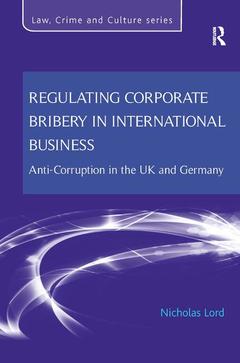Regulating Corporate Bribery in International Business Anti-corruption in the UK and Germany
Auteur : Lord Nicholas

Date de parution : 09-2014
15.6x23.4 cm
Disponible chez l'éditeur (délai d'approvisionnement : 14 jours).
Prix indicatif 164,74 €
Ajouter au panierDate de parution : 01-2017
15.6x23.4 cm
Disponible chez l'éditeur (délai d'approvisionnement : 14 jours).
Prix indicatif 61,25 €
Ajouter au panierMots-clés :
transnational; foreign; public; officials; criminal; liability; transactions; crimes; investigator; overseas; Transnational Corporate Bribery; UK Investigator; UK Bribery Act; Transnational Bribery; UK’s Reputation; UK Bribery; Corporate Bribery; UK Subsidiary; Corporate Criminal Liability; OECD Working Group; OECD Anti-Bribery Convention; Civil Recovery Orders; SelfRegulatory Mechanism; Traditional Law Enforcement Practices; Foreign Public Officials; OECD Convention; Facilitation Payments; Public Prosecutor’s Offices; Passive Bribery; BAE System; UK System; Transnational Corruption; UK's Implementation; Corporate Crime; Deferred Prosecution Agreements



